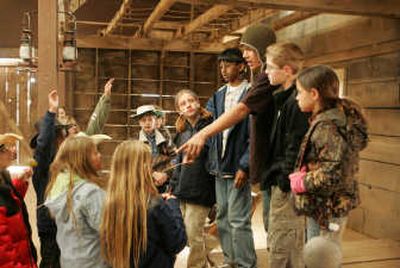Parent critical of safety procedures at ‘Kid Nation’

An upcoming CBS reality series in which youngsters run their own town is coming under criticism even before it airs.
“Kid Nation,” slated to premiere Sept. 19, has prompted complaints from one of the children’s parents – and may have skirted New Mexico’s child-protection laws.
The series was filmed over 40 days during April and May in a movie-set town in the high desert just south of Santa Fe.
While parents and children made available by CBS praised the production as safe, well-supervised and a learning experience, one mother has told authorities the conditions warrant an abuse investigation.
Janis Miles of Fayetteville, Ga., said in a letter that her 12-year-old daughter, Divad Miles, was spattered on her face with grease while cooking potatoes on a wood stove and that four other children required medical attention after they accidentally drank bleach.
Her daughter also had a rash that had caused scarring, and sunburn on her face and hands, Miles wrote.
Santa Fe County Sheriff Greg Solano said his office investigated and found “no prosecutable evidence of neglect or abuse.”
Tom Forman, the show’s executive producer, called the incidents the kinds of accidents that can happen “in any kitchen, in any school, in any home, in any camp.”
The children received immediate medical attention, Forman added.
CBS said paramedics, a pediatrician, an animal safety expert, a child psychologist and a “roster of producers” also were onsite.
The children in the show, ages 8 to 15, hauled water, prepared meals, elected a government and passed laws.
“The whole concept of the show is 40 kids who build a world of their own,” Forman says.
The children are to be paid $5,000 apiece when the series airs, and one child per episode was awarded a solid-gold star by the town’s elected government, worth $20,000.
“I never for one instant felt uncomfortable or unsafe,” said Michael, a 14-year-old participant who lives near Seattle. “We did do some physical work, but it wasn’t like we were chained to water buckets all day.”
Daphne, a Chicago mother, said her 14-year-old son, DK, accidentally used bleach when he was mixing a soda drink but felt fine after he tasted it.
She said the show was an opportunity for her son to meet kids from other backgrounds.
According to documents obtained from the New Mexico attorney general’s office, parents signed a 22-page agreement in which they waived their rights to sue the network or production company if their children died or were injured.
State officials were largely unaware that the production was under way on the privately owned Bonanza Creek Movie Ranch. The state Film Office knew a “highly confidential” TV reality show would be shot there, but no permits were required.
State child labor laws in force at the time of the filming restricted the types of work children could do and hours they could work, and mandated work permits.
Lawyers for Good TV Inc., the show’s producer, told state officials that the “Kid Nation” children were not actors but rather were “volunteer contestants/participants” who did not require permits.
New Mexico’s child labor laws were loosened as of June 15 to mirror California’s more liberal requirements for child actors, because of the burgeoning film industry in the state.